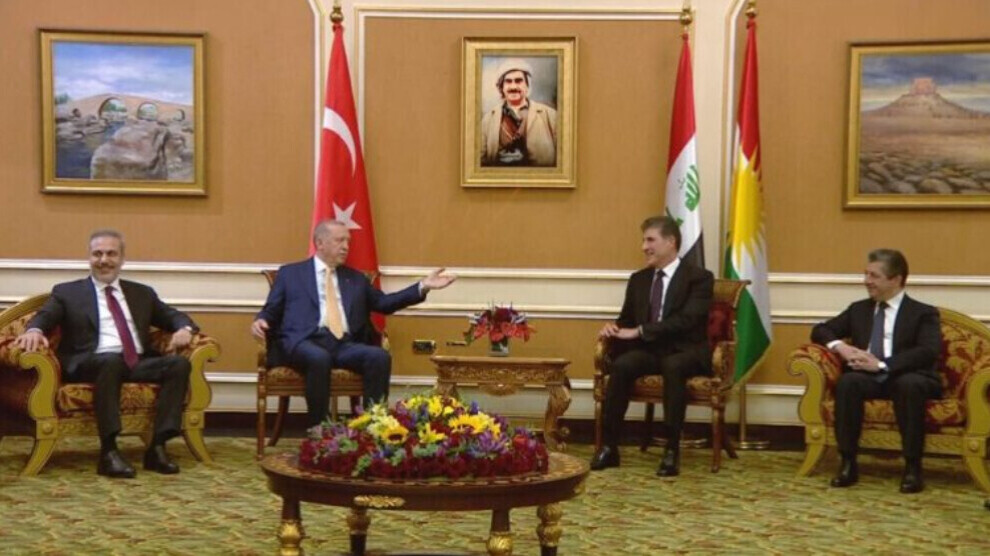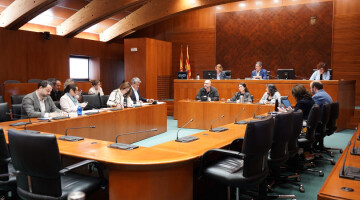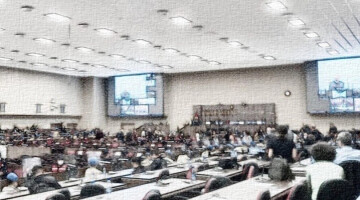The Turkish state is trying to implement its invasion of Southern Kurdistan with the help of the Iraqi government and the Southern Kurdish party KDP. However, the interests of the Iraqi government under Mohammed Shia' al-Sudani and the Turkish state in particular are drifting apart. Ankara and Baghdad signed the “Iraq Development Road Project” and agreed, among other things, a “Framework Agreement on Water Cooperation” and a “Memorandum on the Strategic Framework”. Iraq's hopes lie more in the economic profit expected from these contracts than in a joint war. Meanwhile, the KDP, now a quasi-colonial administrative authority of the Turkish state for Southern Kurdistan, is becoming increasingly tied to Ankara.
Iran recognizes invasion as part of NATO strategy
Furthermore, Iran has intensified its commitment to thwart the AKP-MHP regime's plans for the Middle East, at least to the extent that they run counter to its interests. To this end, it has established a serious presence in the region, particularly through the Shiite forces. Iran is aware that the war waged by Ankara is part of NATO's long-term strategy to gradually encircle Iran.
The requirements for the KDP
The new invasion operation that Erdoğan wants to launch against the Kurdistan freedom movement has both indirect and direct participants. Ankara wants to see greater participation by the KDP in this operation and is putting it under pressure. The KDP should now no longer just surround the Medya Defense Areas, mass troops in the region, block guerrilla passages and provide intelligence and logistical support to the Turkish army, but should also actively participate in the operations. There are so far no signs that the KDP is in a position to reject these demands.
Two ways: either payments to Ankara or absolute allegiance
On the contrary, the KDP sees the Turkish state's demands that it be used more intensively in its occupation plans as an opportunity to overcome its recent problems. The recent Iraqi Federal Court ruling that oil sales must be made by the central government is one of the biggest problems the KDP has yet to resolve. Because much of their system, based on clientelism and nepotism, is based on the money made from selling oil. The court decision puts Hewlêr in a quandary. The KDP must break the illegal oil agreement it concluded with Turkey in 2014 without Baghdad's consent, which provides for a 50-year oil sale, and then pay compensation to both Baghdad and Turkey accordingly. This means that the KDP is in a situation of either paying compensation to Turkey or doing whatever the Turkish state demands of it.
Who did Neçirvan Barzani sit at the table with in Baghdad?
The KDP fears a change in Southern Kurdistan in the upcoming elections on June 10th. There is a conflict within the KDP itself as to whether elections will be held or not. This issue has also led to a crisis between Kurdistan Region President Neçirvan Barzani and KDP chair Mesut Barzani. In the past few days, Neçirvan Barzani set off for intensive talks in Baghdad. He held negotiations with the Sudani government, the President of the National Wisdom Movement, Ammar al-Hakim, the former Iraqi Prime Ministers Adil Abd al-Mahdi and Haider al-Abadi, the Iraqi Defense Minister Sabit Abbasi, the chairman of the Iraqi Rule of Law Coalition, Nouri al- Maliki, Badr Organization Chairman Hadi al-Amiri, Azm Alliance Chairman Muthanna al-Samarrai, Iraqi Undersecretary of State for National Security Qasim al-Ereji and Siyade Coalition Chairman Xemis Xencer.
What deals did Barzani make in Baghdad?
The agenda of Neçirvan Barzani's various meetings became known when Erdoğan was received with great pomp in Hewlêr on April 22nd. The KDP and the Barzani clan had wanted Erdoğan to play an intermediary role between them and the Iraqi central government, in return for active participation in the Turkish invasion of southern Kurdistan. The KDP tried in Baghdad to postpone the elections, which pose an existential threat to its power.
Iraqi military in southern Kurdistan for the first time in 30 years
While some sources indicated that some progress had been made in this regard, at the time of the talks it was reported that Iraqi border guard units had established two military bases in Zaxo. Although it is said that the Iraqi border guard units also include forces under the control of the party (KDP) that controls the region, for the first time in 30 years after the uprising, the Iraqi army has military forces in southern Kurdistan acting on behalf of Iraq. This situation paves the way for Iraq to continue to “legitimize” its forces in the region.
Iraq shows itself ready to act together with Turkey
Baghdad, on the other hand, is striving to cover the revenue from oil sales in the region as well as its energy needs and to implement its stationing plans in Southern Kurdistan step by step. In this way, Iraq is sending the Turkish state a message of willingness to act together in return for some agreements and promises. The new military forces sent to the region by the KDP against the Kurdistan freedom movement also reflect the implementation of this policy.
Dirty deals on Kerkûk
On the other hand, it is noteworthy that Neçirvan Barzani was openly praised by Nouri al-Maliki, the president of the Iraqi Rule of Law Coalition, during the talks in Baghdad: “He can play a role in resolving the problems between us.” Similar praise was given during the Meeting between Iraq and the PUK Bafil Talabanî expressed support for Barzani.
In this context, it is said that Barzani asked the circles he met in Iraq to persuade the PUK to postpone the regional elections. In order to persuade the PUK to do this, the PDK held some discussions about Kerkûk. It is about the question of filling the post of governor of Kerkûk. The issue of the election of the governor of Kerkûk is still controversial due to the KDP's close ties to Turkey, which wants to seize the oil-rich region, and to some Arab organizations. But apparently the PUK will now be offered the governorship of Kerkûk if it accepts the postponement of the elections in Southern Kurdistan.















